Unit-8-课文翻译
Unit-8-Two-Truths-to-Live-By课文翻译
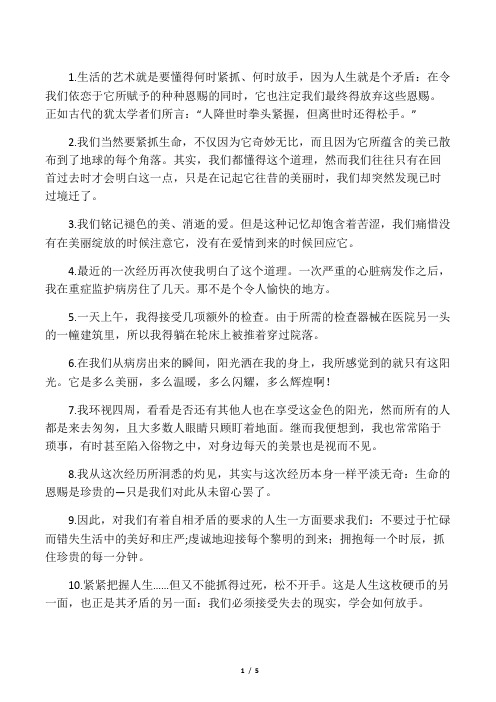
1.生活的艺术就是要懂得何时紧抓、何时放手,因为人生就是个矛盾:在令我们依恋于它所赋予的种种恩赐的同时,它也注定我们最终得放弃这些恩赐。
正如古代的犹太学者们所言:“人降世时拳头紧握,但离世时还得松手。
”2.我们当然要紧抓生命,不仅因为它奇妙无比,而且因为它所蕴含的美已散布到了地球的每个角落。
其实,我们都懂得这个道理,然而我们往往只有在回首过去时才会明白这一点,只是在记起它往昔的美丽时,我们却突然发现已时过境迁了。
3.我们铭记褪色的美、消逝的爱。
但是这种记忆却饱含着苦涩,我们痛惜没有在美丽绽放的时候注意它,没有在爱情到来的时候回应它。
4.最近的一次经历再次使我明白了这个道理。
一次严重的心脏病发作之后,我在重症监护病房住了几天。
那不是个令人愉快的地方。
5.一天上午,我得接受几项额外的检查。
由于所需的检查器械在医院另一头的一幢建筑里,所以我得躺在轮床上被推着穿过院落。
6.在我们从病房出来的瞬间,阳光洒在我的身上,我所感觉到的就只有这阳光。
它是多么美丽,多么温暖,多么闪耀,多么辉煌啊!7.我环视四周,看看是否还有其他人也在享受这金色的阳光,然而所有的人都是来去匆匆,且大多数人眼睛只顾盯着地面。
继而我便想到,我也常常陷于琐事,有时甚至陷入俗物之中,对身边每天的美景也是视而不见。
8.我从这次经历所洞悉的灼见,其实与这次经历本身一样平淡无奇:生命的恩赐是珍贵的—只是我们对此从未留心罢了。
9.因此,对我们有着自相矛盾的要求的人生一方面要求我们:不要过于忙碌而错失生活中的美好和庄严;虔诚地迎接每个黎明的到来;拥抱每一个时辰,抓住珍贵的每一分钟。
10.紧紧把握人生……但又不能抓得过死,松不开手。
这是人生这枚硬币的另一面,也正是其矛盾的另一面:我们必须接受失去的现实,学会如何放手。
11.要学会这点并非易事。
尤其当我们年轻时,以为世界在我们的掌控之中,但凡激情满怀的我们一心想得到的东西,都将属于我们。
但是随着生活的继续,我们面临的种种现实让我们慢慢地明白了生活的第二条真理。
Unit-8-Nature-and-Nurture新编大学英语第二版第三册课文翻译
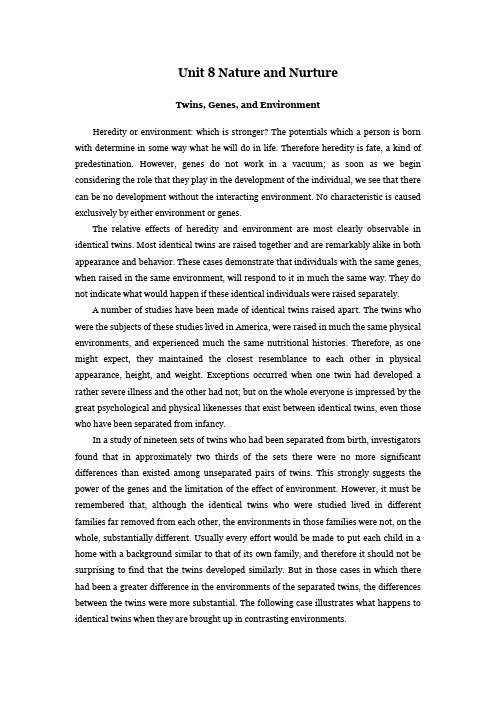
Unit 8 Nature and NurtureTwins, Genes, and EnvironmentHeredity or environment: which is stronger? The potentials which a person is born with determine in some way what he will do in life. Therefore heredity is fate, a kind of predestination. However, genes do not work in a vacuum; as soon as we begin considering the role that they play in the development of the individual, we see that there can be no development without the interacting environment. No characteristic is caused exclusively by either environment or genes.The relative effects of heredity and environment are most clearly observable in identical twins. Most identical twins are raised together and are remarkably alike in both appearance and behavior. These cases demonstrate that individuals with the same genes, when raised in the same environment, will respond to it in much the same way. They do not indicate what would happen if these identical individuals were raised separately.A number of studies have been made of identical twins raised apart. The twins who were the subjects of these studies lived in America, were raised in much the same physical environments, and experienced much the same nutritional histories. Therefore, as one might expect, they maintained the closest resemblance to each other in physical appearance, height, and weight. Exceptions occurred when one twin had developed a rather severe illness and the other had not; but on the whole everyone is impressed by the great psychological and physical likenesses that exist between identical twins, even those who have been separated from infancy.In a study of nineteen sets of twins who had been separated from birth, investigators found that in approximately two thirds of the sets there were no more significant differences than existed among unseparated pairs of twins. This strongly suggests the power of the genes and the limitation of the effect of environment. However, it must be remembered that, although the identical twins who were studied lived in different families far removed from each other, the environments in those families were not, on the whole, substantially different. Usually every effort would be made to put each child in a home with a background similar to that of its own family, and therefore it should not be surprising to find that the twins developed similarly. But in those cases in which there had been a greater difference in the environments of the separated twins, the differences between the twins were more substantial. The following case illustrates what happens to identical twins when they are brought up in contrasting environments.Gladys and Helen were born in a small Ohio town and were separated at about eighteen months of age. They did not meet again until they were twenty-eight years old. Helen had been adopted twice. Her first foster parents had proved to be unstable, and Helen had been returned to the orphanage after a couple of years; after several months she was again adopted, by a farmer and his wife who lived in southeastern Michigan. This was her home for the next twenty-five years. Her second foster-mother, though she had had few educational advantages herself, was determined that Helen should receive a good education; Helen eventually graduated from college, taught school for twelve years, married at twenty-six, and had a daughter.Gladys was adopted by a Canadian railroad conductor and his wife. When she was in the third grade, the family moved to a rather isolated part of the Canadian Rockies, where there were no schools, and Gladys' formal education came to an end, and was not resumed until the family moved to Ontario. She stayed at home and did housework until she was seventeen, and then went to work in a knitting mill. She went to Detroit at nineteen, got a job, and married when she was twenty-one.Helen had been healthier than Gladys, in childhood and adulthood, but other than that, their environments had been very similar except for their educations. Their weight, height, hair color, and teeth were very similar. The differences that distinguished them were obviously associated with the different social lives they had led.Helen was confident, graceful, made the most of her personal appearance, and showed considerable polish and ease in social relationships. Gladys was shy, self-conscious, quiet and without charming or graceful manners. A scientist who studied them remarked, "As an advertisement for a college education the contrast between these two twins should be quite effective."Considering the nature of their environmental experiences, the differences in Helen and Gladys are not surprising. Since psychological traits depend so much upon experience, it is to be expected that they will reflect it. On the other hand, traits that are not liable to be influenced by the environment are more likely to exhibit a high degree of similarity in identical twins. Important as they are, genes alone are never absolutely responsible for any trait. What we can do is set by the genes, but what we actually do is largely determined by the environment.基因、环境与双胞胎遗传与环境究竟哪一个影响更大呢?从某种程度上讲,一个人生来具有的潜力将决定他一生的作为。
Unit_8_Conflicts_in_the_World课文翻译大学体验英语三
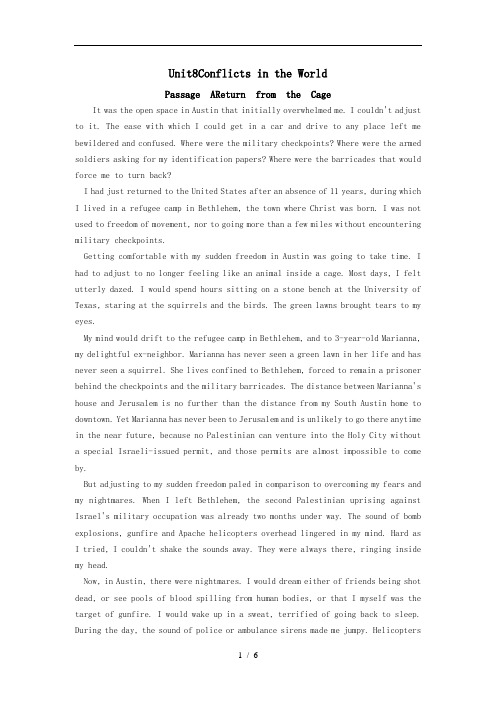
Unit8Conflicts in the WorldPassage AReturn from the CageIt was the open space in Austin that initially overwhelmed me. I couldn't adjust to it. The ease with which I could get in a car and drive to any place left me bewildered and confused. Where were the military checkpoints? Where were the armed soldiers asking for my identification papers? Where were the barricades that would force me to turn back?I had just returned to the United States after an absence of 11 years, during which I lived in a refugee camp in Bethlehem, the town where Christ was born. I was not used to freedom of movement, nor to going more than a few miles without encountering military checkpoints.Getting comfortable with my sudden freedom in Austin was going to take time. I had to adjust to no longer feeling like an animal inside a cage. Most days, I felt utterly dazed. I would spend hours sitting on a stone bench at the University of Texas, staring at the squirrels and the birds. The green lawns brought tears to my eyes.My mind would drift to the refugee camp in Bethlehem, and to 3-year-old Marianna, my delightful ex-neighbor. Marianna has never seen a green lawn in her life and has never seen a squirrel. She lives confined to Bethlehem, forced to remain a prisoner behind the checkpoints and the military barricades. The distance between Marianna's house and Jerusalem is no further than the distance from my South Austin home to downtown. Yet Marianna has never been to Jerusalem and is unlikely to go there anytime in the near future, because no Palestinian can venture into the Holy City without a special Israeli-issued permit, and those permits are almost impossible to come by.But adjusting to my sudden freedom paled in comparison to overcoming my fears and my nightmares. When I left Bethlehem, the second Palestinian uprising against Israel's military occupation was already two months under way. The sound of bomb explosions, gunfire and Apache helicopters overhead lingered in my mind. Hard as I tried, I couldn't shake the sounds away. They were always there, ringing inside my head.Now, in Austin, there were nightmares. I would dream either of friends being shot dead, or see pools of blood spilling from human bodies, or that I myself was the target of gunfire. I would wake up in a sweat, terrified of going back to sleep. During the day, the sound of police or ambulance sirens made me jumpy. Helicoptersflying overhead made me uneasy. I had to constantly remind myself that these were most often civilian and not military helicopters. I had to remind myself that the ambulances were not rushing to the wounded demonstrators.I looked around me, and I wondered if anyone realized, or even knew, that the Apache helicopters being used by the Israeli military to shell innocent Palestinian civilians are actually made in this country! As a writer in Palestine, I had regularly visited bombed-out houses in search of stories. The home of a young nurse sticks out in my mind. A few miles away from the stable in Bethlehem where Christ is said to have been born, her house came under attack by Israeli tanks and was completely burned. I held the remains of some of the tank shells in my two bare hands and read the inscription: "Made in Mesa, Arizona."I wanted to stand on a chair and scream this information to everyone walking through the mall. The tear gas civilians inhale in the Palestinian Territories is made in Pennsylvania, and the helicopters and the F-16 fighter planes are also made in the USA. Yet here in this society, no one appears to care that their tax money funds armies that bring death and destruction to civilians, civilians who are no different from civilians in this country.And I worry about the indifference in this country. I worry because someday, young American men will find themselves fighting another Vietnam War - this time possibly in the Middle East - without a notion of what it is they are doing there. And we will have a repetition of history: Mothers will lose sons and wives will lose husbands in an unnecessary war. I have been repeating this warning in all the talks I have been giving in the past nine months. No one took me seriously. I couldn't understand why young Americans, with their whole futures ahead of them, should go to die in a war they will not understand.逃出牢笼刚回到奥斯丁的时候,使我感到无所适从的是这里的广阔自由天地。
Unit8 课文翻译
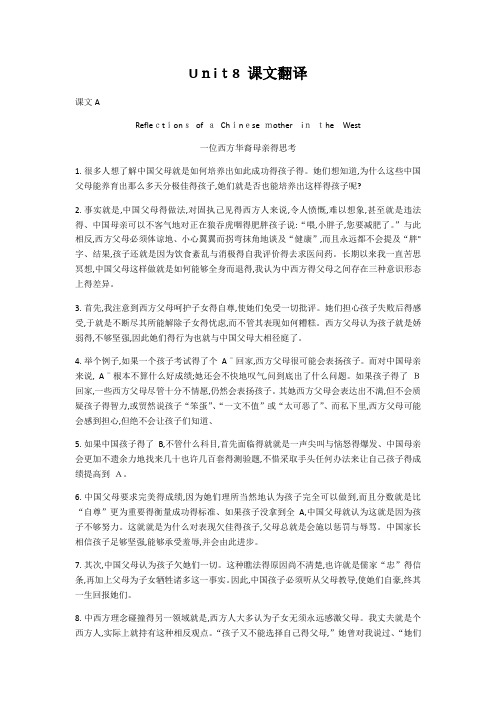
Unit8 课文翻译课文AReflectionsof aChinese mother inthe West一位西方华裔母亲得思考1.很多人想了解中国父母就是如何培养出如此成功得孩子得。
她们想知道,为什么这些中国父母能养育出那么多天分极佳得孩子,她们就是否也能培养出这样得孩子呢?2.事实就是,中国父母得做法,对固执己见得西方人来说,令人愤慨,难以想象,甚至就是违法得、中国母亲可以不客气地对正在狼吞虎咽得肥胖孩子说:“喂,小胖子,您要减肥了。
”与此相反,西方父母必须体谅地、小心翼翼而拐弯抹角地谈及“健康”,而且永远都不会提及“胖"字、结果,孩子还就是因为饮食紊乱与消极得自我评价得去求医问药。
长期以来我一直苦思冥想,中国父母这样做就是如何能够全身而退得,我认为中西方得父母之间存在三种意识形态上得差异。
3.首先,我注意到西方父母呵护子女得自尊,使她们免受一切批评。
她们担心孩子失败后得感受,于就是不断尽其所能解除子女得忧虑,而不管其表现如何糟糕。
西方父母认为孩子就是娇弱得,不够坚强,因此她们得行为也就与中国父母大相径庭了。
4.举个例子,如果一个孩子考试得了个Aˉ回家,西方父母很可能会表扬孩子。
而对中国母亲来说, Aˉ根本不算什么好成绩;她还会不快地叹气,问到底出了什么问题。
如果孩子得了B回家,一些西方父母尽管十分不情愿,仍然会表扬孩子。
其她西方父母会表达出不满,但不会质疑孩子得智力,或贸然说孩子“笨蛋”、“一文不值”或“太可恶了”、而私下里,西方父母可能会感到担心,但绝不会让孩子们知道、5.如果中国孩子得了B,不管什么科目,首先面临得就就是一声尖叫与恼怒得爆发、中国母亲会更加不遗余力地找来几十也许几百套得测验题,不惜采取手头任何办法来让自己孩子得成绩提高到A。
6.中国父母要求完美得成绩,因为她们理所当然地认为孩子完全可以做到,而且分数就是比“自尊”更为重要得衡量成功得标准、如果孩子没拿到全A,中国父母就认为这就是因为孩子不够努力。
新标准大学英语综合教程(第二版)UNIT-8-B篇练习答案+课文翻译
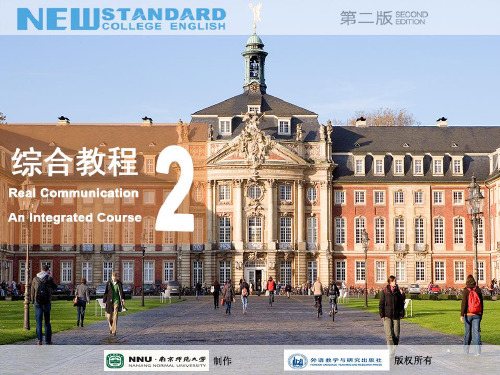
Warming Up
Becoming a volunteer of ILP will truly change your life. It’s you change the life of the children across the world. Because English is such an international language, teaching this language to kids is great lesson in their lives. Also, interaction with ILP participants with high standards and care for these kids influence them in profound ways beyond just learning another language. The method ILP uses is great. You know, I’m not an English teacher. I’m not ILP education teacher, and first thing I thought, you know, was am I qualified to teach kids? But the method we used is really just playing in the environment. Where you are going, you are teaching the kids English inversion.
Text
What did you do as a volunteer, and where? 1 IwenttoBangladeshwithVolunteersforPeace.WemetinDhaka,andthentook an eight-hour bus ride to the village of Dinajpur. VFP worked side by side with another local agency in Dinajpur. We set up their annual cataract eye camp, with free cataract surgery for the local elderly or anyone that needed an eye check. We helped set up the school, cleaned it out, and turned the classroom into the surgery room. It was called the “operation theater”.
Unit 8 The Discus Thrower课文翻译综合教程四

Unit 8The Discus ThrowerRichard Selzer1 I spy on my patients. Ought not a doctor to observe his patients by any meansand from any stance that he might take for the more fully assemble evidence? So I stand in the doorways of hospital rooms and gaze. Oh, it is not all that furtive an act.Those in bed need only look up to discover me. But they never do.2 From the doorway of Room 542 the man in the bed seems deeply tanned. Blueeyes and close-cropped white hair give him the appearance of vigor and good health.But I know that his skin is not brown from the sun. It is rusted, rather, in the last stage of containing the vile repose within. And the blue eyes are frosted, looking inward like the windows of a snowbound cottage. This man is blind. This man is also legless ― the right leg missing from midthigh down, the left from just below the knee.It gives him the look of a bonsai, roots and branches pruned into the dwarfed facsimile of a great tree.3 Propped on pillows, he cups his right thigh in both hands. Now and then heshakes his head as though acknowledging the intensity of his suffering. In all of this he makes no sound. Is he mute as well as blind?4 The room in which he dwells is empty of all possessions ― no get-well cards,small, private caches of food, day-old flowers, slippers, all the usual kickshaws of the sick room. There is only the bed, a chair, a nightstand, and a tray on wheels that can be swung across his lap for meals.5 “What time is it?” he asks.“Three o’clock.”“Morning or afternoon?”“Afternoon.”He is silent. There is nothing else he wants to know.“How are you?” I say.“Who are you?” he asks.“It’s the doctor. How do you feel?”He does not answer right away.“Feel?” he says.“I hope you feel better,” I say.I press the button at the side of the bed.“Down you go,” I say.“Yes, down,” he says.6 He falls back upon the bed awkwardly. His stumps, unweighted by legs and feet,rise in the air, presenting themselves. I unwrap the bandages from the stumps, and begin to cut away the black scabs and the dead, glazed fat with scissors and forceps.A shard of white bone comes loose. I pick it away. I wash the wounds withdisinfectant and redress the stumps. All this while, he does not speak. What is he thinking behind those lids that do not blink? Is he remembering a time when he was whole? Does he dream of feet? Or when his body was not a rotting log?7 He lies solid and inert. In spite of everything, he remains impressive, as thoughhe were a sailor standing athwart a slanting deck.“Anything more I can do for you?” I ask.For a long moment he is silent.“Yes,” he says at last and without the least irony. “You can bring me a pair of shoes.”In the corridor, the head nurse is waiting for me.“We have to do something about him,” she says. “Every morning he orders scrambled eggs for breakfast, and, instead of eating them, he picks up the plate and throws it against the wall.”“Throws his plate?”“Nasty. That’s what he is. No wonder his family doesn’t come to visit. They probably can’t stand him any more than we can.”She is waiting for me to do something.“Well?”“We’ll see,” I say.8 The next morning I am waiting in the corridor when the kitchen delivers hisbreakfast. I watch the aide place the tray on the stand and swing it across his lap. She presses the button to raise the head of the bed. Then she leaves.9 In time the man reaches to find the rim of the tray, then on to find the dome ofthe covered dish. He lifts off the cover and places it on the stand. He fingers across the plate until he probes the eggs. He lifts the plate in both hands, sets it on the palm of his right hand, centers it, balances it. He hefts it up and down slightly, getting the feel on it. Abruptly, he draws back his right arm as far as he can.10 There is the crack of the plate breaking against the wall at the foot of his bed andthe small wet sound of the scrambled eggs dropping to the floor.11 And then he laughs. It is a sound you have never heard. It is something newunder the sun. It could cure cancer.Out in the corridor, the eyes of the head nurse narrow.“Laughed, did he?”She writes something down on her clipboard.12 A second aide arrives, brings a second breakfast tray, puts it on the nightstand,out of his reach. She looks over at me shaking her head and making her mouth go. I see that we are to be accomplices.13 “I’ve got to feed you,” she says to the man.“Oh, no, you don’t,” the man says.“Oh, yes, I do,” the aide says, “after the way you just did. Nurse says so.”“Get me my shoes,” the man says.“Here’s the oatmeal,” the aide says. “Open.” And she touches the spoon to his lower lip.“I ordered scrambled eggs,” says the man.“That’s right,” the aide says.I step forward.“Is there anything I can do?” I say.“Who are you?” the man asks.14 In the evening I go once more to that ward to make my rounds. The head nursereports to me that Room 542 is deceased. She has discovered this by accident, she says. No, there had been no sound. Nothing. It’s a ble ssing, she says.15 I go into his room, a spy looking for secrets. He is still there in his bed. His faceis relaxed, grave, dignified. After a while, I turn to leave. My gaze sweeps the wall at the foot of the bed, and I see the place where it has been repeatedly washed, where the wall looks very clean and white.掷铁饼者理查德·塞尔泽1 我窥探我的病人。
Unit-8-Computers-and-Security课文翻译大学体验英语二
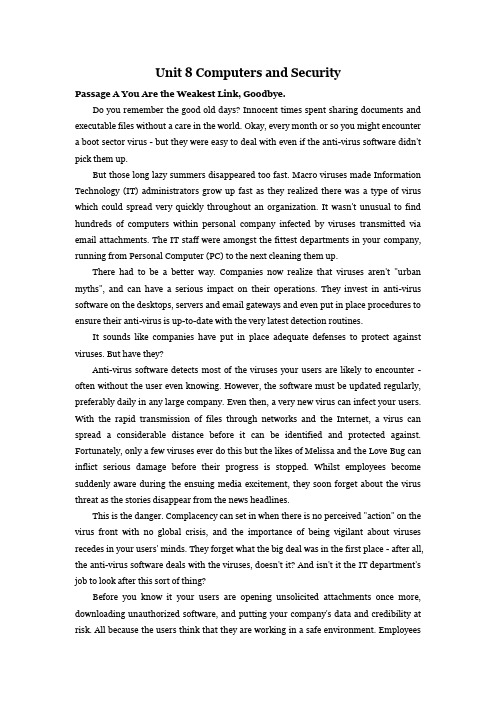
Unit 8 Computers and SecurityPassage A You Are the Weakest Link, Goodbye.Do you remember the good old days? Innocent times spent sharing documents and executable files without a care in the world. Okay, every month or so you might encounter a boot sector virus - but they were easy to deal with even if the anti-virus software didn't pick them up.But those long lazy summers disappeared too fast. Macro viruses made Information Technology (IT) administrators grow up fast as they realized there was a type of virus which could spread very quickly throughout an organization. It wasn't unusual to find hundreds of computers within personal company infected by viruses transmitted via email attachments. The IT staff were amongst the fittest departments in your company, running from Personal Computer (PC) to the next cleaning them up.There had to be a better way. Companies now realize that viruses aren't "urban myths", and can have a serious impact on their operations. They invest in anti-virus software on the desktops, servers and email gateways and even put in place procedures to ensure their anti-virus is up-to-date with the very latest detection routines.It sounds like companies have put in place adequate defenses to protect against viruses. But have they?Anti-virus software detects most of the viruses your users are likely to encounter - often without the user even knowing. However, the software must be updated regularly, preferably daily in any large company. Even then, a very new virus can infect your users. With the rapid transmission of files through networks and the Internet, a virus can spread a considerable distance before it can be identified and protected against. Fortunately, only a few viruses ever do this but the likes of Melissa and the Love Bug can inflict serious damage before their progress is stopped. Whilst employees become suddenly aware during the ensuing media excitement, they soon forget about the virus threat as the stories disappear from the news headlines.This is the danger. Complacency can set in when there is no perceived "action" on the virus front with no global crisis, and the importance of being vigilant about viruses recedes in your users' minds. They forget what the big deal was in the first place - after all, the anti-virus software deals with the viruses, doesn't it? And isn't it the IT department's job to look after this sort of thing?Before you know it your users are opening unsolicited attachments once more, downloading unauthorized software, and putting your company's data and credibility at risk. All because the users think that they are working in a safe environment. Employeessee anti-virus software, firewalls and IT departments as guarantees that their computers will work and will be safe. Of course, there aren't any guarantees. Anti-virus software plays one, albeit important, part in the defense of your company from malicious attack but the security of your computer system is only as strong as the weakest link. And that, more often than not, is the human factor.No employer wants to come across as a killjoy or an ogre. Most will willingly accept that the happiest employees are those who feel that they are respected and trusted by their employer. Many companies accept that employees will send and receive a certain amount of personal email and make the odd personal telephone call.However, the worry comes when employees start risking company security in pursuit of personal amusement. Funny screensavers and games downloaded from the Internet can seem harmless enough but they could easily be harboring a dangerous virus.Software downloaded from the net is often unlicensed and unsupported, and may cause conflicts with existing software in use at your company. Unlicensed, pirated software is an ideal vector for a computer virus. Virus writers and hackers often use such software as the ideal "kick-start" for their virus distribution.It is vitally important that employees be educated about the virus threat but this cannot be a one-off event. The potential threat should always be in the back of an employee's mind and precautionary measures should be taken as a matter of course. There is no harm in reminding people about what could happen if they let their guard down. In the end, education is the key to a virus-free environment and this is a continual process. It may not be the most exciting thing on the agenda but it works.The lesson is simple. You can have the best software in the world protecting your company's defenses; you can even be the biggest IT company in the world; but without your users practicing safe computing they will always be the weakest link.PA 你是最薄弱的环节,再见还记得美好的往日时光吗?在那样的纯真年代,我们共享文档和可执行文件,根本没有半点顾虑。
资料《Unit8课文原文与翻译(素材)译林版八年级英语下册》
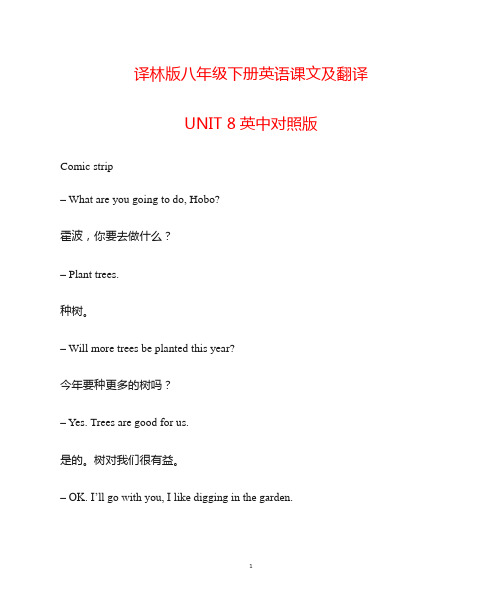
译林版八年级下册英语课文及翻译UNIT 8英中对照版Comic strip– What are you going to do, Hobo?霍波,你要去做什么?– Plant trees.种树。
– Will more trees be planted this year?今年要种更多的树吗?– Yes. Trees are good for us.是的。
树对我们很有益。
–OK. I’ll go with you, I like digging in the garden.好的。
我跟你一起去。
我喜欢在花园里挖洞。
– Are you serious?你是认真的吗?–Sure, I’ll plant breadfruit trees. Breadfruit … Yummy!当然。
我要种面包果树。
面包果……好吃!Welcome to the unit– What should we do to live a green life, class?同学们,对绿色生活我们应该做些什么呢?– My dad used to drive me to school, but now we take the underground.More and more families own cars and this causes serious air pollution.我的爸爸以前常常开车送我去上学,但是现在我们坐地铁了。
越来越多的家庭拥有汽车,导致严重的空气污染。
–I agree. It’s wise for people to choose public transport or ride bicycles.我同意。
人们选择公共交通或骑自行车是很明智的。
– I think we can take shorter showers to save water.我认为我们应该缩短淋浴时间,以节约用水。
– Yes. And we should remember to turn off the lights when we leave a room.是的。
四年级英语上册素材-Unit8 Where are you from课文翻译 湘鲁版

Unit8 Where are you from?第八单元你来自哪里?Section AA部分1. Look and listen看图片听对话Welcome to Winter Camp.欢迎来到冬令营。
I'm Mike. I'm from Canada.我叫迈克。
我来自加拿大。
I'm Lali. I'm from India.我叫拉丽。
我来自印度。
Hi. I'm Tim. I'm from the UK.嗨。
我叫蒂姆。
我来自英国。
I'm Zhou Lin. I'm from China.我叫周林。
我来自中国。
Nice to meet you.很高兴见到你。
Where are you from?你来自哪里?I'm from the US.我来自美国。
2. Listen, circle and say听录音,圈出你听到的内容并跟着说Canada 加拿大China 中国India 印度US 美国3. Look, listen and try看图,听录音并试着描述Hasna Malaysia 10马来西亚哈斯娜10岁This is Hasna.这是哈斯娜。
She is from Malaysia.她来自马来西亚。
She is ten.她十岁了。
Mike Canada 11加拿大迈克11岁This is Mike.这是迈克。
He is from Canada.他来自加拿大。
He is eleven.他十一岁。
Tim UK 12蒂姆英国12岁This is Tim.这是蒂姆。
He is from the UK.他来自英国。
He is twelve.他十二岁。
4. Listen and tick听录音并选择正确答案This is Lali.这是拉丽。
She is from India.她来自印度。
She is eleven years old.她十一岁了。
Unit 8 Money新编大学英语第二版第二册课文翻译
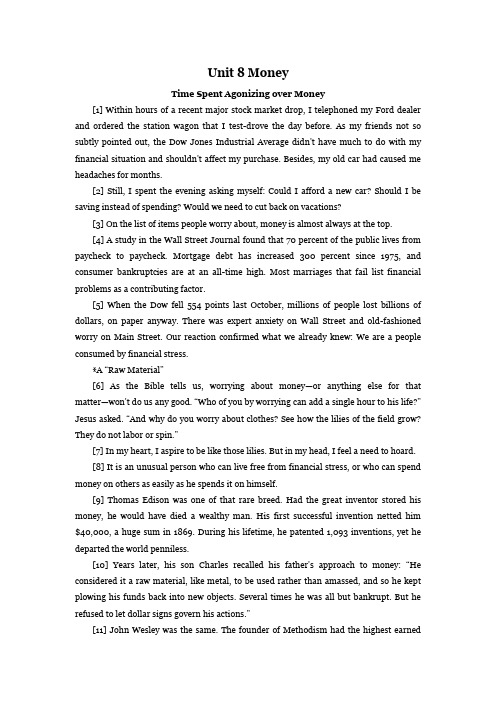
Unit 8 MoneyTime Spent Agonizing over Money[1] Within hours of a recent major stock market drop, I telephoned my Ford dealer and ordered the station wagon that I test-drove the day before. As my friends not so subtly pointed out, the Dow Jones Industrial Average didn't have much to do with my financial situation and shouldn't affect my purchase. Besides, my old car had caused me headaches for months.[2] Still, I spent the evening asking myself: Could I afford a new car? Should I be saving instead of spending? Would we need to cut back on vacations?[3] On the list of items people worry about, money is almost always at the top.[4] A study in the Wall Street Journal found that 70 percent of the public lives from paycheck to paycheck. Mortgage debt has increased 300 percent since 1975, and consumer bankruptcies are at an all-time high. Most marriages that fail list financial problems as a contributing factor.[5] When the Dow fell 554 points last October, millions of people lost billions of dollars, on paper anyway. There was expert anxiety on Wall Street and old-fashioned worry on Main Street. Our reaction confirmed what we already knew: We are a people consumed by financial stress.*A “Raw Material”[6] As the Bible tells us, worrying about money—or anything else for that matter—won't do us any good. “Who of you by worrying can add a single hour to his life?” Jesus asked. “And why do you worry about clothes? See how the lilies of the field grow? They do not labor or spin.”[7] In my heart, I aspire to be like those lilies. But in my head, I feel a need to hoard.[8] It is an unusual person who can live free from financial stress, or who can spend money on others as easily as he spends it on himself.[9] Thomas Edison was one of that rare breed. Had the great inventor stored his money, he would have died a wealthy man. His first successful invention netted him $40,000, a huge sum in 1869. During his lifetime, he patented 1,093 inventions, yet he departed the world penniless.[10] Years later, his son C harles recalled his father's approach to money: “He considered it a raw material, like metal, to be used rather than amassed, and so he kept plowing his funds back into new objects. Several times he was all but bankrupt. But he refused to let dollar signs govern his actions.”[11] John Wesley was the same. The founder of Methodism had the highest earnedincome in 18th century England, but he gave it all away. His philosophy about money was simple: “Earn all you can, save all you can, give all you can.”*Root of Evil?[12] Money may not be the root of all evil, but if it keeps us up at night, it has become way too important in our lives.[13] That was the lesson of Leo Tolstoy's tale “Elias”, which told of a rich farm couple who lost all their money and were forced to take jobs as servants.[14] A guest one day asked the wife if she was miserable being poor, especially in light of the great wealth she had once enjoyed. The woman's answer—that she was happier than ever before—surprised the visitor.[15] “W hen we were rich, my husband and I had so many cares that we had no time to talk to one another, or to think of our souls, or to pray to God,” the wife explained. “We lay awake at night worrying, lest the ewes should lie on their lambs, and we got up again and again to see that all was well... Now, when my husband and I wake in the morning, we always greet each other in love and harmony. We live peacefully, having nothing to worry about.”[16] For most of us, financial security is an elusive goal. No matter how much we have, it's not enough. Kahlil Gibran put it this way: “The fear of need, when the pantry is full, is the thirst that can not be satisfied.”[17] When the stock market falls, we can panic, hoard, and worry if we have enough. Or we can take a deep breath and remember: Money is merely a raw material to be plowed back into something else.把时间花在为钱苦恼上1 最近一次股市大跌后的几个小时内,我就打电话给我的福特汽车商,订购了我前一天试开过的旅行车。
六年级英语上册素材-Unit8 Do you enjoy playing tennis课文翻译 湘鲁版

Unit8 Do you enjoy playing tennis?第八单元你喜欢打网球吗?Section AA部分1. Look, listen and act看、听并表演It is the weekend.今天是周末。
Zhou Lin, Andy, Wang Li, Li Xiao and Amy周林、安迪、王丽、李晓和艾米are going roller skating in the park.要去公园玩轮式溜冰。
Hey, this is fun.嘿,这个很有趣。
I enjoy roller skating.我喜欢滑旱冰。
Me, too.我也喜欢。
Do you enjoy playing badminton?你喜欢打羽毛球吗?No, I don't.不,我不喜欢。
I enjoy playing badminton.我喜欢打羽毛球。
Do you enjoy flying a kite?你喜欢放风筝吗?No, I don't.不,我不喜欢。
I enjoy flying a big kite.我喜欢放大风筝。
How about you, Wang Li?你呢,王丽?I enjoy flying a big kite, too.我也喜欢放大风筝。
Do you enjoy playing tennis?你喜欢打网球吗?Yes, I do.是的,我喜欢。
I also enjoy playing volleyball.我还喜欢打排球。
Good.很好。
Let's play volleyball this afternoon. 今天下午咱们打排球吧。
OK!好的!2. Listen and say听和说Do you enjoy playing tennis?你喜欢打网球吗?Yes, I do.是的,我喜欢。
I also enjoy playing table tennis.我还喜欢打乒乓球。
u8九年级课文翻译

Unit8 SectionB 2b 巨石阵—谁能解释它的纯在? 巨石阵,一个岩石圈,不仅是英国的最著名的历史 古迹之一,而且是最大的谜团之一。每年,它接待75 万多游客。人们尤其喜欢在六月份去这个地方,因为 他们想在一年中最长的一天看日出。 许多年来,历史学家认为巨石阵是一座古代领导人 试图与神灵沟通的寺庙。然而,历史学家保罗•斯托 克认为这不可能是真实的,因为巨石阵建于许多个世 纪之前。“这些领导人抵达英国玩得多,”他指出。
Unit8 Section A 2d
妈妈:那么它可能仍然在公园里吗? 琳达:是的,我在其他朋友离开之前就 早离开了。我认为一定有人捡到了它。 现在我将给他们打电话,看看是否有人 捡到了它。
Unit8 Section A 3a
发生在我镇的奇事 我们住在一个小镇上,并且几乎每个人都彼此认 识。它过去一直很安静,这附近未曾发生过什么事。 然而,这些天来某件不寻常的事正在我们镇发生。维 克托,我的学校的一名教师,非常紧张。城镇报社采 访他时,他说:“每天晚上我们都听到窗外有奇怪的 噪音。我妻子认为它可能是一种动物,但我和我的朋 友们认为那一定是青少年在玩耍。我的父母报了警, 但他们没发现任何异常。他们认为那可能是风造成的 ,我并不这样认为!”
Unit8 It must belong to Carla. Section A 2d 琳达:妈妈,我非常担心。 妈妈:为什么?出什么事了? 琳达:我找不到我的书包了。 妈妈:噢,你最好把它放在哪儿了? 琳达:我不记得了!昨天我参加了一个音乐会,所 以它可能仍然在音乐大厅里。 妈妈:你书包里有什么有价值的东西吗? 琳达:没有,只有我的书、粉色发带和一些网球。 妈妈:那么它不可能被偷。 琳达哦,等等!音乐会后我去野餐了。我记得野餐 我还随身携带着书包。
人教新版九年级英语Unit8课文翻译以及重难点讲解

P.59 A 3a参考译文我们住在一个小镇上,并且几乎每个人都彼此认识。
它过去一直很安静,这附近未曾发生过什么事。
然而,这些天来某件不寻常的事正在我们镇发生。
维克托,我的学校的一名教师,非常紧张。
城镇报社采访他时,他说:“每天晚上我们都听到窗外有奇怪的噪音。
我妻子认为它可能是一种动物,但我和我的朋友们认为那一定是青少年们在玩耍。
我的父母报了警,但他们没发现任何异常。
他们认为那可能是风造成的,我并不这样认为!“维克托的隔壁邻居海伦也很担心。
“起初,我认为它可能是一只狗,但我没看到狗,也没看见其他任何东西。
所以我猜测它不可能是一只狗。
但它可能是什么呢?”当地的一个妇女看见有个东西逃跑了,但是天黑了,所以她不确定。
“我认为它太大而不可能是一只狗,”她说,“也许它是一只熊或一只狼。
”我们镇的每个人都在感到不安,并且每个人都有他(她)自己的观点。
一定有什么东西闯入了我们社区的住户家中,但它是什么呢?我们不知道。
大多数人希望这个动物或人会径直走开(go away),但我认为它没那么简单。
噪音制造者对于在社区里制造恐惧乐此不疲。
课文重难点讲解:I.must have done sth.表示对过去事情的肯定推测,意为“一定做过某事”,该结构只用于肯定结构e.g.Lily must have done the chores all night,for she looks very sleepy.It must have rained last night,for the ground is wet.I noticed that he did not wear a watch and realized that he must have lost it on his way home.我注意到他没有戴手表,意识到他一定在回家的路上丢了。
II.T here must be sb/sth+动词ing+地点表示“x处一定有x人/x物正在做x 事”e.g.It is too noisy.There must be some people fighting in that office.There must be a girl singing in the field.III.belong to 属于to是介词, 后接名词(短语)或代词(用宾格形式)作宾语。
【良心出品】Unit 8 Love and Resentment 课文翻译
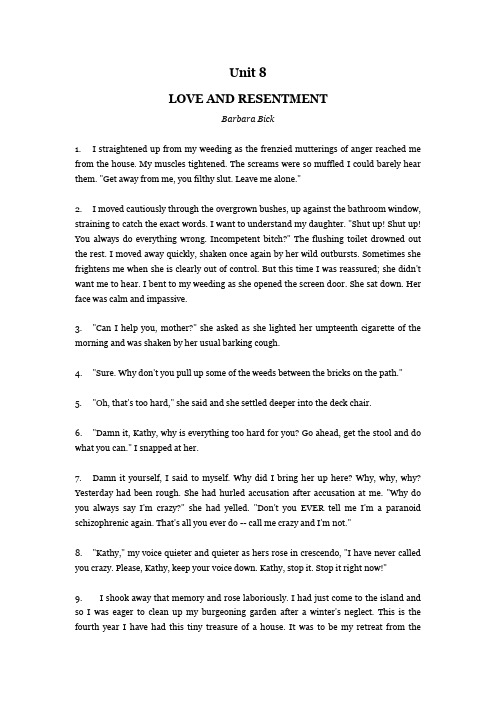
Unit 8LOVE AND RESENTMENTBarbara Bick1. I straightened up from my weeding as the frenzied mutterings of anger reached me from the house. My muscles tightened. The screams were so muffled I could barely hear them. "Get away from me, you filthy slut. Leave me alone."2. I moved cautiously through the overgrown bushes, up against the bathroom window, straining to catch the exact words. I want to understand my daughter. "Shut up! Shut up! You always do everything wrong. Incompetent bitch?" The flushing toilet drowned out the rest. I moved away quickly, shaken once again by her wild outbursts. Sometimes she frightens me when she is clearly out of control. But this time I was reassured; she didn't want me to hear. I bent to my weeding as she opened the screen door. She sat down. Her face was calm and impassive.3. "Can I help you, mother?" she asked as she lighted her umpteenth cigarette of the morning and was shaken by her usual barking cough.4. "Sure. Why don't you pull up some of the weeds between the bricks on the path."5. "Oh, that's too hard," she said and she settled deeper into the deck chair.6. "Damn it, Kathy, why is everything too hard for you? Go ahead, get the stool and do what you can." I snapped at her.7. Damn it yourself, I said to myself. Why did I bring her up here? Why, why, why? Yesterday had been rough. She had hurled accusation after accusation at me. "Why do you always say I'm crazy?" she had yelled. "Don't you EVER tell me I'm a paranoid schizophrenic again. That's all you ever do -- call me crazy and I'm not."8. "Kathy," my voice quieter and quieter as hers rose in crescendo, "I have never called you crazy. Please, Kathy, keep your voice down. Kathy, stop it. Stop it right now!"9. I shook away that memory and rose laboriously. I had just come to the island and so I was eager to clean up my burgeoning garden after a winter's neglect. This is the fourth year I have had this tiny treasure of a house. It was to be my retreat from theharassing city, the social and political commitments I take on each year, the needs of family and friends.10. For three summers I have brought my 40-year-old daughter to the island to spend two weeks with me. Surely, I can live for two weeks with the tension and outbursts. Her life is so limited and mine is so full. A short span of days, really, for me to take care of her; to give her some joy. I have so many days, just for me, after she goes back to the city.11. But I can't. I resent the tension. I lose patience. Sometimes I hate her. What is wrong with me? I am strong and healthy; she is vulnerable and ill. It is always my choice to have her here. But I count the days until she is gone and there are moments when I think, no, not another summer. Why do this to myself? Most of the time I know that these weeks are too important to her; I cannot take them away.12. She doesn't sleep well. Before I came up, I discussed the sleeping problem with her psychiatrist so that he could prescribe some medication. I couldn't bring myself to tell him that I am afraid to be deep in sleep while she is awake. She is not physically violent. In all the 24 years of her illness, she has attacked me only three times. But they remain with me. Each time, her adrenaline-induced strength had overwhelmed me. And no matter how intimate one is with this illness, the primordial fear of madness lurks deep within. The medication the doctor suggested doesn't work and my bedroom here is an open room without a door to lock. So, I sleep lightly these nights. I sense the lights blazing downstairs. I listen to her cough as she smokes and mutters through the long hours. I try to imagine — out of my own healthy body — what it is like to be Kathy.13. Physically, she always feels unwell. The antipsychotic medication has many unpleasant side effects. More than that, she has no empathy with her own body, cannot take care of it. She eats badly, drinks coffee constantly, smokes incessantly, does no exercise. She has perpetual headaches and frequent stomachaches.14. For years she suffered from Crohn's disease, a deep inflammation of the colon, leaving her little or no control of her bowels. She has been plagued and humiliated by accidents in public. People have responded to this affliction by yelling at her, calling her filthy. She has silently accepted the appellation, taken it within her. "Filthy bitch!" she yells at herself. "Go away!"15. I lie awake, my throat tight and aching as I remember the years when her illness was more active, filled with agonizing hallucinations that most of us, during a lifetime, experience for only seconds in our worst, most searing nightmares.16. She had been a normal, beautiful child. The changes began in high school. Kathy started a diary when she was 16 years old. She wrote: "This morning I feel as though someone took a file and sandpaper and scratched off all my epidermis. I feel raw and sore and ugly and dirty and loathsome. I also have a headache and coffee makes it worse. I escape thru dreams and the pressure of returning reality gives me a headache.17. "Something inside me is going thru this funny, alien state, a sense of being at the mercy of some strange force, and this pathetic scarecrow figure inside me at the mercy of other forces. My stomach is empty and gnawing and uneasy as if anything could fall in and break the superstructure I hold up with all my force."18. Kathy did go off to college. The trauma of her breakdown there was followed by the deadening travail of the long search for a psychiatric solution. Then, a decade of daily life in the huge psychiatric hospital, the "crazy house" as she always called it. In those years, she has never been able to draw a deep breath full of good life.19. The daughter I would have had — were it not for this evil illness — exists in embryo in the daughter I do have. After an outburst, she will come and tell me quietly: "I am sorry, mother. I don't want to fight with you."20. "Thank you," she will say: "for giving me a good day."21. To admit the truth, sometimes I trigger her outburst. Like Tuesday, when I came upon her pouring coffee straight from the jar, half filling her cup with the powder and splattering grains over the counter. I ordered her, peremptorily: "Get a spoon, Kathy. Can't you do things normally once in a while!"22. She whirled and, in a shrill tone, screamed: "I am sick of you always telling me what to do. I am an adult and I don't need you to tell me when to go to bed and when to get up." Hysteria building up, she shouted: "You drive everyone to the edge of hemophiliac absurdity!" Magnetic waves of burning energy rushed from her, hit me and I lashed back, "Get out of this house, Kathy. RIGHT NOW, get out!"23. Later, in the evening, she almost whispers to me: "I've washed my hair, done my nails, and I've cleaned up the dinner dishes. I feel much better now." And I feel sad and ashamed. I know her greatest wish is to live with me all of the time, to have me take care of her, cook her good meals every day as I do these two weeks on the island.24. That I will not do. I must live my own life. But I will give her the small chunks of time: the island for two weeks in summer; at home with me at Christmas; a trip to Florida to see her grandparents. I will also allow myself to resent it sometimes. Like my daughter, like all other human beings, I am not spun of one thread. I love and hate the same person.I am responsible and irresponsible. I will do the best I can with the worst I have to live with.爱与恨1. 癫狂愤怒的喃喃自语声从屋子里传出来,我停止除草,站起身来。
Unit8课文原文与翻译(素材)译林版九年级英语上册
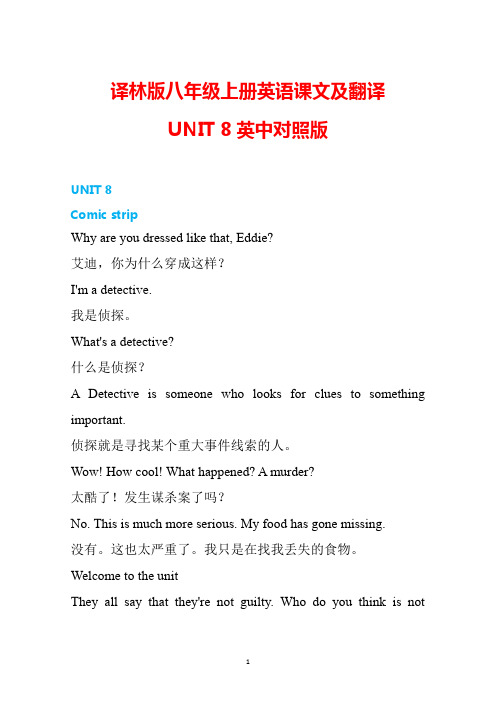
译林版八年级上册英语课文及翻译UNIT 8英中对照版UNIT 8Comic stripWhy are you dressed like that, Eddie?艾迪,你为什么穿成这样?I'm a detective.我是侦探。
What's a detective?什么是侦探?A Detective is someone who looks for clues to something important.侦探就是寻找某个重大事件线索的人。
Wow! How cool! What happened? A murder?太酷了!发生谋杀案了吗?No. This is much more serious. My food has gone missing.没有。
这也太严重了。
我只是在找我丢失的食物。
Welcome to the unitThey all say that they're not guilty. Who do you think is nottelling the truth?他们都说自己是无辜的。
你认为谁说了谎话?I guess Jimmy White is lying. He might be the murderer because he lives in Sun Town.我认为吉米·怀特在说谎。
因为他就住在阳光小镇,所以他很有可能是凶手。
I don't think so. Jimmy is helpful, and he was in another place when the murder happened. Perhaps Frank Johnson killed the young man.我不这么认为。
吉米很乐于助人,而且案发的时候他并不在现场。
可能弗兰卡·约翰逊杀了那个男人。
Who's Frank Johnson?谁是弗兰克·约翰逊?He's an office worker of medium height. He looks untidy and nervous.他是一名上班族,中等身高。
Unit-8-The-Discus-Thrower课文翻译综合教程四

Unit 8The Discus ThrowerRichard Selzer1 I spy on my patients. Ought not a doctor to observe his patients by any meansand from any stance that he might take for the more fully assemble evidence? So I stand in the doorways of hospital rooms and gaze. Oh, it is not all that furtive an act.Those in bed need only look up to discover me. But they never do.2 From the doorway of Room 542 the man in the bed seems deeply tanned. Blueeyes and close-cropped white hair give him the appearance of vigor and good health.But I know that his skin is not brown from the sun. It is rusted, rather, in the last stage of containing the vile repose within. And the blue eyes are frosted, looking inward like the windows of a snowbound cottage. This man is blind. This man is also legless ― the right leg missing from midthigh down, the left from just below the knee.It gives him the look of a bonsai, roots and branches pruned into the dwarfed facsimile of a great tree.3 Propped on pillows, he cups his right thigh in both hands. Now and then heshakes his head as though acknowledging the intensity of his suffering. In all of this he makes no sound. Is he mute as well as blind?4 The room in which he dwells is empty of all possessions ― no get-well cards,small, private caches of food, day-old flowers, slippers, all the usual kickshaws of the sick room. There is only the bed, a chair, a nightstand, and a tray on wheels that can be swung across his lap for meals.5 “What time is it?” he asks.“Three o’clock.”“Morning or afternoon?”“Afternoon.”He is silent. There is nothing else he wants to know.“How are you?” I say.“Who are you?” he asks.“It’s the doctor. How do you feel?”He does not answer right away.“Feel?” he says.“I hope you feel better,” I say.I press the button at the side of the bed.“Down you go,” I say.“Yes, down,” he says.6 He falls back upon the bed awkwardly. His stumps, unweighted by legs and feet,rise in the air, presenting themselves. I unwrap the bandages from the stumps, and begin to cut away the black scabs and the dead, glazed fat with scissors and forceps.A shard of white bone comes loose. I pick it away. I wash the wounds withdisinfectant and redress the stumps. All this while, he does not speak. What is he thinking behind those lids that do not blink? Is he remembering a time when he was whole? Does he dream of feet? Or when his body was not a rotting log?7 He lies solid and inert. In spite of everything, he remains impressive, as thoughhe were a sailor standing athwart a slanting deck.“Anything more I can do for you?” I ask.For a long moment he is silent.“Yes,” he says at last and without the least irony. “You can bring me a pair of shoes.”In the corridor, the head nurse is waiting for me.“We have to do something about him,” she says. “Every morning he orders scrambled eggs for breakfast, and, instead of eating them, he picks up the plate and throws it against the wall.”“Throws his plate?”“Nasty. That’s what he is. No wonder his family doesn’t come to visit. They probably can’t stand him any more than we can.”She is waiting for me to do something.“Well?”“We’ll see,” I say.8 The next morning I am waiting in the corridor when the kitchen delivers hisbreakfast. I watch the aide place the tray on the stand and swing it across his lap. She presses the button to raise the head of the bed. Then she leaves.9 In time the man reaches to find the rim of the tray, then on to find the dome ofthe covered dish. He lifts off the cover and places it on the stand. He fingers across the plate until he probes the eggs. He lifts the plate in both hands, sets it on the palm of his right hand, centers it, balances it. He hefts it up and down slightly, getting the feel on it. Abruptly, he draws back his right arm as far as he can.10 There is the crack of the plate breaking against the wall at the foot of his bed andthe small wet sound of the scrambled eggs dropping to the floor.11 And then he laughs. It is a sound you have never heard. It is something newunder the sun. It could cure cancer.Out in the corridor, the eyes of the head nurse narrow.“Laughed, did he?”She writes something down on her clipboard.12 A second aide arrives, brings a second breakfast tray, puts it on the nightstand,out of his reach. She looks over at me shaking her head and making her mouth go. I see that we are to be accomplices.13 “I’ve got to feed you,” she says to the man.“Oh, no, you don’t,” the man says.“Oh, yes, I do,” the aide says, “after the way you just did. Nurse says so.”“Get me my shoes,” the man says.“Here’s the oatmeal,” the aide says. “Open.” And she touches the spoon to his lower lip.“I ordered scrambled eggs,” says the man.“That’s right,” the aide says.I step forward.“Is there anything I can do?” I say.“Who are you?” the man asks.14 In the evening I go once more to that ward to make my rounds. The head nursereports to me that Room 542 is deceased. She has discovered this by accident, she says. No, there had been no sound. Nothing. It’s a bl essing, she says.15 I go into his room, a spy looking for secrets. He is still there in his bed. His faceis relaxed, grave, dignified. After a while, I turn to leave. My gaze sweeps the wall at the foot of the bed, and I see the place where it has been repeatedly washed, where the wall looks very clean and white.掷铁饼者理查德·塞尔泽1 我窥探我的病人。
Unit 8 Honesty 课文翻译

• Washington’s first biographer invented the tale of little George saying to his father, “I cannot tell a lie. I did it with my ax.” What is important in both stories, however, is that honesty was seen as an important part of the American character.
• 越来越多的州要求学生通过能力测试以取 得中学毕业文凭。很多教育学家担心,更 多地利用州级考试将会导致作弊的相应增 加。
• A case in point is students in New York State who faced criminal misdemeanor charges for possessing and selling advance copies of state Regents examinations.
• 根据最近的一次民意测验,百分之六十一 的美国学生承认曾在考试中至少作过一次 弊。人们可以争论说,这样一种回答也许 没有多大意义。
• After all, most students have been faced with the temptation to peek at a neighbor’s test paper. And students can be hard on themselves in judging such behavior. However, there are other indications that high school cheating may be on the rise.
- 1、下载文档前请自行甄别文档内容的完整性,平台不提供额外的编辑、内容补充、找答案等附加服务。
- 2、"仅部分预览"的文档,不可在线预览部分如存在完整性等问题,可反馈申请退款(可完整预览的文档不适用该条件!)。
- 3、如文档侵犯您的权益,请联系客服反馈,我们会尽快为您处理(人工客服工作时间:9:00-18:30)。
Unit 8 课文翻译
P59---3a
When I first arrived on this island, I had nothing. But I’ve found the ship and made a small boat. I’ve brought back many things I can use---food and drinks, tools, knives and guns.Although I have lost everything, I have not lost my life. So I will not give up and I will wait for another ship. I have already cut down trees and built a house.I go out with my gun almost every day to kill animals and birds for food.I’m even learning to grow fruit and vegetables.
当我第一次到达这个岛屿的时候,我一无所有。
但是我发现了这艘大船,然后做了艘小船。
我已经带回来了许多我能够用到的东西---食物,饮料,工具,刀,和枪。
尽管我已经失去了所有,但是我没有失去我的生命。
因此我将不会放弃,我会永远等待另外一艘船。
我已经砍了树,造了房子。
我每天出去几乎都带着我的枪去打动物和鸟来作为食物。
我甚至学习去种水果和蔬菜。
A few weeks ago, I found the marks of another man’s feet on the sand.Who else is on the island? How long have they been here?Not long after that, I saw some cannibals trying to kill two men from a broken ship.One of them died but the other ran towards my house.I helped him killed the cannibals.This man now lives with me and helps me.I named him Friday because that was the day I met him.He is smart and I have already taught him some English.
一个星期以前,我发现了另外一个人在沙地上的足迹。
还有谁在这个岛屿上呢?他们在这里有多久了?在那不久之后,我看到两个食人肉者正在试图杀掉来自于一艘破船的两个人。
他们其中的一个死了,另外一个朝我的房子这边跑来。
我帮助他杀死了食人肉者。
这个男人现在和我住在一起,并且帮助我。
我把他叫做星期五,因为我就是在那天遇见他的。
他
很聪明,而且我已经教会了他一些英语。
P62 A Country Music Song Changed Her Life Forever
乡村音乐永远改变了她的生活
When Sarah was a teenager, she used to fight over almost everything with her family.But five years ago, while she was studying abroad in England, she heard a song full of feelings about returning home on the radio.It made Sarah think about her actually missed all of them.Ever since then, she has been a fan of American country music.
当萨拉是一个青少年的时候,她过去常常和她的家人争夺几乎所有的东西。
但是五年前,当她正在英国学习的时候,她在收音机上听到一首充满回家情感的歌。
这使得萨拉想到她是真的思念他们所有人。
自从那时候起,她就一直是美国乡村音乐的粉丝。
Country is a traditional kind of music from the southern states of America.Nashville, T ennessee is the home of country music.Many songs these days are just about modern life in the US, such as the importance of money and success, but not about belonging to a group.However, country music brings us back to the “good old days” when people were kind to each other and trusted one another.It reminds us that the best thing in life are free--laughter, friends, family, and the beauty of nature and the countryside.
乡村音乐是一种来自于美国南部的州的传统音乐。
纳什维尔,田纳西州是乡村音乐的发源地。
如今许多歌都只是关于美国的现代生活,例如金钱和成功的重要性,而不是关于属于一个集体。
然而,乡村音乐将我们带回到了过去的好时光,那会人们对彼此都很友好,而且信任彼此。
这提醒我们生活中最好的东西是自由---笑声,家庭以及自然和乡村的美丽。
Sarah hasn’t been to Nashville yet, but it is her dream to go there one day.She has already read a lot about the place and done some research on it.She knows that there is a Country Music Hall of Fame Museum in Nashville.There are also always a lot of great country music concerts with famous musicians and singers, like Garth Brooks.Sarah has already listened to most of his songs.Garth is one of the most successful musicians in American history.He’s sold more than 120 million records.
I hope to see him sing live one day!
萨拉还没有去过纳什维尔,但是有朝一日去那是她的梦想。
她已经了解了很多关于这个地方的资料,而且对这个地方也做了写研究。
她知道那里有一个乡村音乐名人堂博物馆。
那里经常会有许多著名的音乐家和歌手演唱的乡村音乐会,比如布鲁克斯。
萨拉已经听过了他的大部分歌曲。
布鲁克斯是美国历史上最成功的音乐家之一。
他已经卖出了1.2多亿的唱
片。
我希望有一天看到他的现场演唱!。
